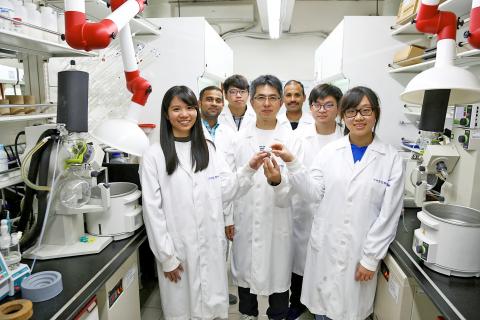Academia Sinica yesterday said that its researchers have developed an antibody testing method for COVID-19 and have made progress synthesizing remdesivir, a medicine that many believe could cure the infection.
The Centers for Disease Control on Tuesday sent serum samples to Academia Sinica of three people who had contact with Taiwan’s first COVID-19 fatality, as part of an effort to determine the source of that infection.
The three had tested negative for RNA viruses, but the centers hoped to discover if they had developed antibodies.

Photo courtesy of Academia Sinica
Test results showed that only one sample had antibodies for COVID-19 and SARS, Academia Sinica Institute of Biomedical Sciences research fellow Lin Yi-ling (林宜玲) said.
The sample was obtained from a Taiwanese businessperson who was not listed as a confirmed case, because their immune system beat the virus, she said.
Little is known about COVID-19, so it is still a mystery whether a person who has recovered from it can contract it again, she added.
The method is useful in tracing the transmission chain of a certain case, Institute of Plant and Microbial Biology Director Wu Shu-hsing (吳素幸) said, but added that testing for RNA viruses tells whether a person contracts COVID-19.
Using molecular biology and genetic engineering, Wu said that she pieced together plasmids — a kind of DNA for expressing antigens — in small templates to make up longer series of plasmids for producing the antigens used to test for COVID-19, SARS and Middle East respiratory syndrome antibodies.
Ordering massive plasmid series from overseas manufacturers takes two to three weeks, Lin said, praising Wu’s team for only needing a week.
After Institute of Biological Chemistry associate research fellow Ho Meng-chiao (何孟樵) purified the nucleocapsid protein of COVID-19 for making reagents, Lin used the western blot method to place the antigens in a serum sample for testing antibody reactions, she said.
Another team led by Institute of Chemistry associate research fellow Chein Rong-jie (陳榮傑) succeeded in synthesizing 100mg of remdesivir in two weeks.
Unable to obtain the raw materials in time, they used materials on hand and molecule synthesis, referencing public-domain literature, to make the drug, which on Thursday was 97 percent as pure as the original, Chein said.
Before the centers tasked them with the mission, Academia Sinica President James Liao (廖俊智) last month formed a task force to speed up the development of antigens, antibodies, drugs and vaccines for COVID-19.
The synthesized drug cannot be used without the consent of the US pharmaceutical firm that manufactures remdesivir, Liao said.
Nonetheless, the achievement showed that Academia Sinica is capable of drug synthesis and could facilitate mass production of the drug after a technology transfer has been completed, he added.

Tropical Storm Gaemi strengthened into a typhoon at 2pm yesterday, and could make landfall in Yilan County tomorrow, the Central Weather Administration (CWA) said yesterday. The agency was scheduled to issue a sea warning at 11:30pm yesterday, and could issue a land warning later today. Gaemi was moving north-northwest at 4kph, carrying maximum sustained winds near its center of up to 118.8kph and gusts of 154.8kph. The circumference is forecast to reach eastern Taiwan tomorrow morning, with the center making landfall in Yilan County later that night before departing from the north coast, CWA weather forecaster Kuan Shin-ping (官欣平) said yesterday. Uncertainty remains and

SEA WARNING LIKELY: The storm, named Gaemi, could become a moderate typhoon on Wednesday or Thursday, with the Taipei City Government preparing for flooding A tropical depression east of the Philippines developed into a tropical storm named Gaemi at 2pm yesterday, and was moving toward eastern Taiwan, the Central Weather Administration (CWA) said. Gaemi could begin to affect Taiwan proper on Tuesday, lasting until Friday, and could develop into a moderate typhoon on Wednesday or Thursday, it said. A sea warning for Gaemi could be issued as early as Tuesday morning, it added. Gaemi, the third tropical storm in the Pacific Ocean this typhoon season, is projected to begin moving northwest today, and be closest to Taiwan on Wednesday or Thursday, the agency said. Today, there would likely

DISRUPTIONS: The high-speed rail is to operate as normal, while several airlines either canceled flights or announced early departures or late arrivals Schools and offices in 15 cities and counties are to be closed today due to Typhoon Gaemi, local governments announced last night. The 15 are: Taipei, New Taipei City, Taoyuan, Tainan, Keelung, Hsinchu and Kaohsiung, as well as Yilan, Hualien, Hsinchu, Miaoli, Chiayi, Pingtung, Penghu and Lienchiang counties. People should brace for torrential rainfall brought by the storm, with its center forecast to make landfall on the east coast between tonight and tomorrow morning, the Central Weather Administration (CWA) said. The agency issued a sea warning for the typhoon at 11:30pm on Monday, followed by a land warning at 11:30am yesterday. As of

CASUALTY: A 70-year-old woman was killed by a falling tree in Kaohsiung as the premier warned all government agencies to remain on high alert for the next 24 hours Schools and offices nationwide are to be closed for a second day today as Typhoon Gaemi crosses over the nation, bringing torrential rain and whipping winds. Gaemi was forecast to make landfall late last night. From Tuesday night, its outer band brought substantial rainfall and strong winds to the nation. As of 6:15pm last night, the typhoon’s center was 20km southeast of Hualien County, Central Weather Administration (CWA) data showed. It was moving at 19kph and had a radius of 250km. As of 3pm yesterday, one woman had died, while 58 people were injured, the Central Emergency Operation Center said. The 70-year-old